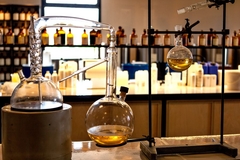Boston Micro Fabrication venture scales new complex organ-on-a-chip platforms for cosmetic testing

01 May 2024 --- Boston Micro Fabrication (BMF) launches a venture focused on developing and commercializing BioChips — tiny, microfluidic organ-on-a-chip platforms that mimic human tissue.
The new venture is called BMF Biotechnology and is headquartered in San Diego, US.
By cultivating large complex tissues in a controlled environment based on BioChips, BMF Biotechnology aims to accelerate the development of new cosmetic products and therapies, which typically rely on animal testing.
“Building on the success that BMF has had with other self-driven innovations such as the UltraThineer veneers, the launch of BMF Biotechnology represents a significant leap forward in our ability to harness the potential of 3D BioChip technology,” says Dr. Jennifer Sun, chief scientific officer at BMF Biotechnology.
“With our innovative technology and approach, we aim to empower researchers with the tools they need to translate scientific discoveries into tangible therapeutic solutions that improve patient outcomes.”
“Vascular-mimetic” channels
BMF specializes in high-precision micro-printing platforms for product designers and engineers in medical devices, electronics, optics/photonics and life sciences who require a “high level” of feature resolution and “demanding” dimensional tolerance.
By replicating the physiological conditions found in the human body, BMF Biotechnology’s BioChips offer a “powerful platform” for studying health and disease biological mechanisms, evaluating drug and cosmetic safety and efficacy and predicting patient responses.
 Organ-on-a-chip technologies present a viable alternative to animal testing.BioChips feature an integrated “vascular-mimetic” network of channels, enabling in “vivo-like” nutrient and waste exchange and compound delivery across the entire large tissue.
Organ-on-a-chip technologies present a viable alternative to animal testing.BioChips feature an integrated “vascular-mimetic” network of channels, enabling in “vivo-like” nutrient and waste exchange and compound delivery across the entire large tissue.
“This potentially yields more precise testing results and compound sensitivity compared to traditional 2D cell culture and animal models,” highlights BMF.
The company has cultivated robust tissue models, such as tumor models for assessing drug efficacy, kidney models for evaluating drug safety and skin models for cosmetic assessments.
“Additionally, collaborations with global partners have led to the development of various other tissue models to help researchers better understand the biological mechanisms of health and disease, including liver and heart conditions, lung cancer, endometrial cancer and more,” details the company.
Technological trajectory
Building on its core business of supplying Projection Micro Stereolithography technology, BMF has expanded its reach since late 2022.
A vital part of this initiative was the San Diego Research Institute launch, dedicated to pioneering microfluidic BioChips for advancements in drug discovery and cosmetic testing.
This initial research phase has yielded “encouraging” results, paving the way for future developments in the field.
To help “fully realize the power of the BioChips,” BMF Biotechnology is now recruiting collaboration partners.
The BMF Biotechnology Partner Program offers a range of activities to develop and validate innovative devices and biological models jointly. It welcomes industry, research and academic bodies to reach out and explore potential collaborations.
Cruelty-free testing advances
Growing consumer and political awareness around animal testing continues to propel advances in safety screening measures, such as organ-on-a-chip technologies.
The European Commission openly responded to a European Citizens’ Initiative that petitioned against animal cruelty by laying out an action plan to “ultimately eliminate” animal testing for chemicals.
In the US, A bipartisan delegation led by a group of US congressmen has reintroduced the Humane Cosmetics Act to end safety testing of cosmetic products on animals and prohibit the sale of products developed using animal testing in the country. Canada, meanwhile, passed measures through its Budget Implementation Act (Bill C-47) to ban animal testing and trade for cosmetics.
Brazil, South America’s most prominent beauty market, partially banned animal testing for “personal hygiene products, cosmetics and perfumes.”
In a recent Special Report, Personal Care Insights explored the latest innovations aimed at eliminating animal testing for chemicals, including artificial skin models and metabolomics for safety assessments.
Exsymol, specializing in the design and production of active cosmetic ingredients, collaborates with ExAdEx-Innov, a French biotechnology start-up from Nice University, to develop its active ingredients portfolio using 3D in vitro models of human adipose tissue.
By Benjamin Ferrer













